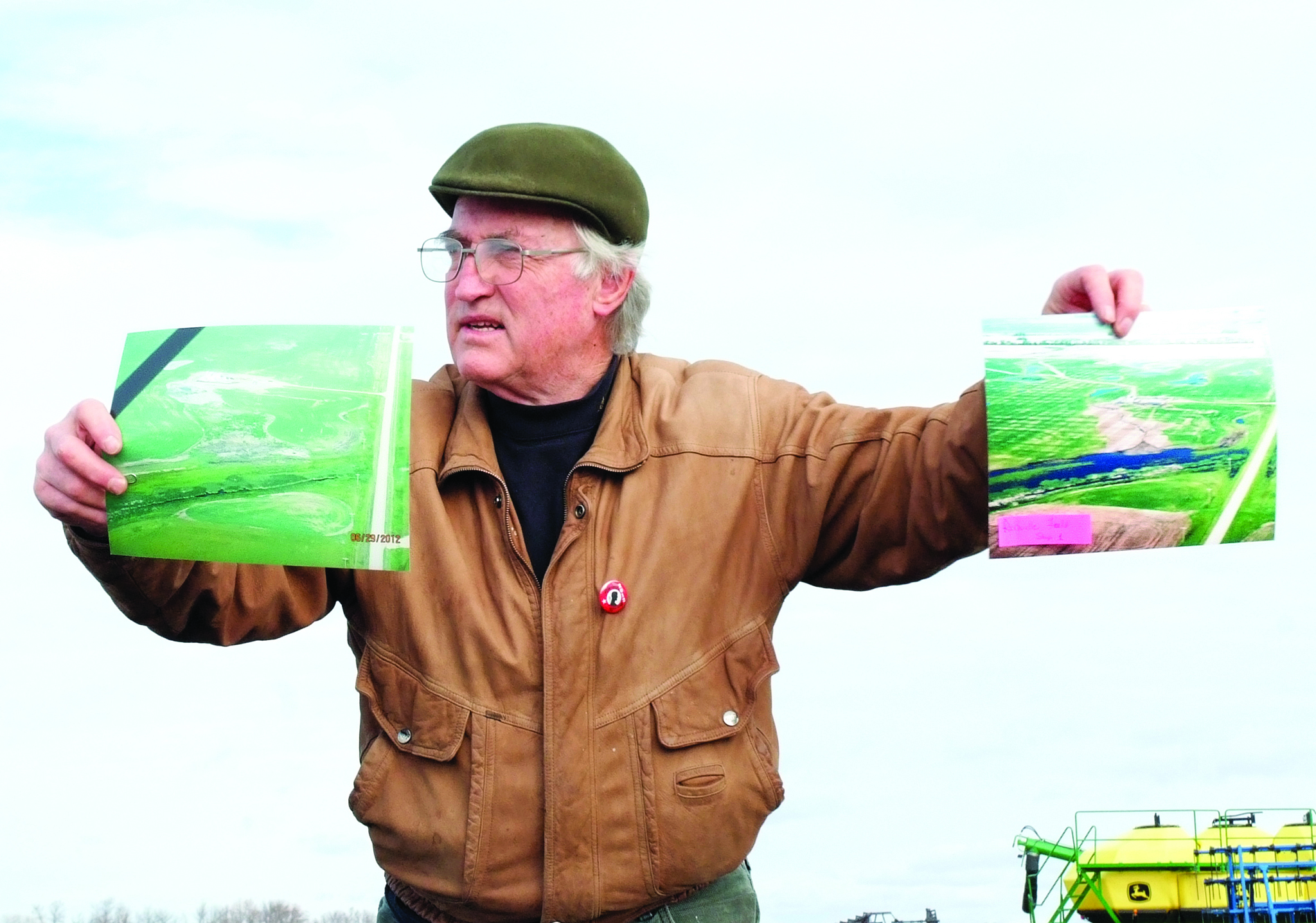News
Seeking answers in the oil field
Scott Wagar
10/29/2013

When it comes to oil production in Bottineau County there is always a concern about oil spills and the ecological damage it can do; however, when it comes to local agricultural producers in the county, their concern is more about saltwater spills from the oil industry and the unending damage it can do to crop land and the environment, itself.
On Monday, Oct. 21, Fintan Dooley, an attorney out of Milwaukee, Wis., and Donny Nelson of Keene, N.D., hosted a tour around the area of Antler with a number of individuals to witness how saltwater has damaged cropland, and how they want the oil industry and the state’s government leaders to fix the problem at hand fairly.
The issue is serious in Bottineau County due to the fact the county has more damaged cropland due to saltwater spills than any other county in North Dakota. This was seen by those who took the tour as Dooley and Nelson went from one site to the next where individuals saw salt infested soil and water in the areas.
EVAPORATION SITE
One of the spots toured was the Leachate site, which has been well documented by State Geologist Edward Murphy for the North Dakota Geological Survey department. The Leachate site consisted of two unlined ponds, which was utilized for the evaporation of brines due to oil and gas production from 1959 to the late 1970s.
When it was closed, the site was then backfilled and leveled, but saltwater continued to spread from the site where it has destroyed cropland, killed trees and continues to impede the environment in that area today.
PIPELINES
Another site was the Renville Township Large site, which is also called the Kramer Disposal Spill. In late spring or early summer of 2011, a pipeline crack and affected over 30 acres of private land, which wasn’t discovered until July of that year. Initially, it was reported that 300 barrels spilled at the site, but it was later estimated the spill was closer to 2 million gallons or 50,000 barrels.
Tiles are being utilized to collect the water at the location, but over two years after the spill portions of the land is still covered by water with a high content of salt, while the crop will only grow weeds that is acceptable to saltwater.
It is estimated that the cost of clean-up is $1 million per acre and $2 million per acre if the land has to be dug out.
The group also saw a pipeline spill of saltwater on land farmed by Mike Artz due to a pressurized pipe that broke because the company responsible didn’t pay close attention to an instrument gauge which would have informed the company there was an issue with the line.
Artz’s land is currently being cleaned up, but it was stated that it took some negotiations to get the clean up started. The group was also shown a barley field that was affected by the spill which showed damage to the crop.
Near Antler there is a field called the Rock Pile where another spill occurred at an oil site destroying a barley field. The site is still blackened by the spill in one large area and no barley can be found in the field, it is left with only a worthless weed and the field appears to have no future production quality to it.
DEFENDING WETLANDS AND CROPS
Dooley and Nelson plan to continue their fight in bringing tougher regulations against oil companies concerning saltwater spills and making sure that the state’s standardizes the regulations so agricultural producers, land owners and those who care for North Dakota’s eco-system can see better results than what they are seeing now in the northwestern part of the county.
“The oil company seems to be getting by when it involves salt, and farmers are not getting a bye when it involves lets say a pile of rocks,” Dooley said.
“We would like to see the federal and state departments be as vigilant about wetlands, and as vigilant toward oil companies, as they are toward a farmer that might make a mistake and have his program payments terminated or suspended, or put into question.”
Dooley and Nelson’s mission in getting the word out on saltwater damaged might be moving forward. Late Friday afternoon, the North Dakota Department of Health sent out a press release announcing it was developing a webpage that will report all spill reports on its website.
“The North Dakota Department of Health announced today that it is testing the design of a webpage that will publish statewide spills reported to the department. The online report will involve all spills, including those involving the commercial, agriculture and energy industries. The incidents reports, which are already public documents, will be easily accessible on the department’s website,” stated the North Dakota Department of Health.
“According to state law, all spills – regardless of the size or amount – are required to be reported to the state. In some cases, federal agencies require notification and maintain jurisdiction.
“Department staff is currently testing the webpage’s functionality,” the NDDH added. “The Department of Health plans to go live with the webpage in the near future and will provide further information to direct web traffic.”
